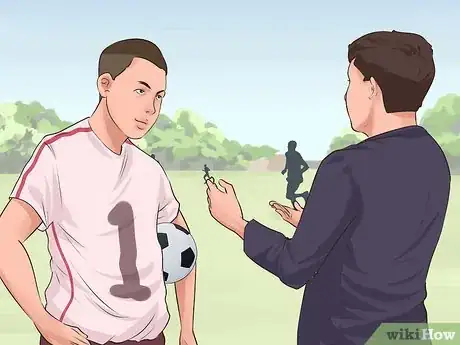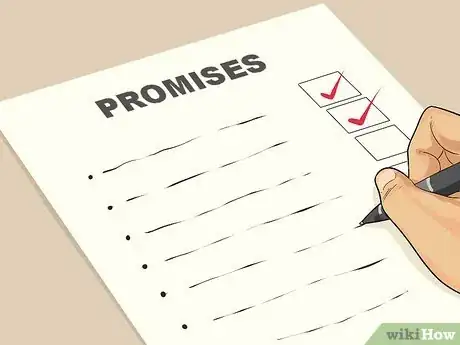This article was co-authored by Katie Styzek. Katie Styzek is a Professional School Counselor for Chicago Public Schools. Katie earned a BS in Elementary Education with a Concentration in Mathematics from the University of Illinois at Urbana-Champaign. She served as a middle school mathematics, science, and social studies teacher for three years prior to becoming a counselor. She holds a Master of Education (M.Ed.) in School Counseling from DePaul University and an MA in Educational Leadership from Northeastern Illinois University. Katie holds an Illinois School Counselor Endorsement License (Type 73 Service Personnel), an Illinois Principal License (formerly Type 75), and an Illinois Elementary Education Teaching License (Type 03, K – 9). She is also Nationally Board Certified in School Counseling from the National Board for Professional Teaching Standards.
There are 7 references cited in this article, which can be found at the bottom of the page.
wikiHow marks an article as reader-approved once it receives enough positive feedback. This article received 15 testimonials and 89% of readers who voted found it helpful, earning it our reader-approved status.
This article has been viewed 320,805 times.
Getting involved in school politics is a great way to boost your resume, gain leadership experience, and make an impact on how your school operates. Campaigning can be some work and be time-consuming, but functioning as a student representative can be rewarding. Preparing yourself and getting support from your peers can be difficult, but not impossible if you follow some basic steps.
Steps
Enlisting Support for Your Campaign
-
1Ask your friends. You should approach the people closest to you for help first. Make sure your friends, or any family members you may have at the school, know that you are running and ask them to vote for you.
- Also ask your friends to get their friends to vote for you. If they do, it can greatly augment the number of votes you receive.
-
2Seek out special interest groups. Identify groups at your school who have a vested interest in one particular aspect of the school’s operations and solicit them for help. Sports teams and academic clubs are great groups to approach, since these groups utilize school resources for activities from which individual members benefit.[1]
- Approach the football team to see if they need new equipment, a better playing field, or more support from the student body. As a student representative, you may be able to help them achieve these goals.
- Get involved in special events and fundraisers for particular causes as well. If the chess team has a fundraiser to help them travel to a tournament, your presence at the event could be reason enough for the entire chess club to vote for you.
Advertisement -
3Identify important student issues. There may be some issues that are important to the student body at large. Figure out what these issues are and take a position on them to rally support for your campaign.[2]
- Maybe the student body wants more vending machines or better food in the lunchroom. Vow to address these issues as a class representative and more people will vote for you.
- Be careful when taking a position on divisive issues, however, as you risk alienating certain segments of the student body on particularly charged issues.
-
4Be outgoing. Introverts are rarely selected for student government through general elections because people feel more comfortable voting for someone they know well. High school politics are often to referred to as popularity contests for a reason. As such, you need to get out there and become acquainted with your peers and classmates.
- Regardless of your class size, try to convince each individual to vote for you.
- Be friendly to everyone, including your fellow contenders.
- Participate in class and answer questions so that other students look up to you.[3]
-
5Enlist faculty support. Some schools do not allow faculty members to be involved in student elections in any way. Others require a faculty supervisor for candidates. Figure out your school’s policy and, if necessary, enlist faculty support. Approach a teacher who you know you work well with and ask him or her.
Advertising Your Campaign
-
1Follow the rules. Every school has different rules and guidelines for the use of marketing materials in your campaign. Make sure you are aware of these rules and follow them closely. You don’t want to be disqualified from your campaign.
- Don't hang flyers or posters for your campaign in areas of the school where they are not supposed to be.
- Don't pass out trinkets or gifts to potential voters if this is not allowed in your school.
-
2Make campaign signs. You're not going to win if people don't know you're running. Put up eye-catching posters with memorable slogans to attract the attention of your classmates.[4] Make sure to use bright colors and place these posters in highly trafficked areas of the school, as this will help make sure your signs get seen.
- If there is a particular hallway or room where students congregate often, place your campaign signs in that area.
- Use neon green, yellow, orange or pink poster boards to make your signs. These colors have been proven effective in catching people's attention.
-
3Utilize handouts. Make fliers, buttons, and pamphlets to pass among your peers. As helpful as signs will be to your campaign, giving the voters something physical that they can hold on to will serve as a reminder that you are running throughout the duration of the campaign. [5] In your fliers or pamphlets, make sure you espouse some positions and give the voters some information about yourself.
- Try handing out candy. Everyone loves candy and they really like the people who give it to them for free!
- If your school doesn't allow you to hand out candy, then try handing out bracelets, pencils, and stickers.[6] You may find that people are sticking your stickers on the wall and that is just extra exposure.
-
4Chalk the sidewalks. If you school will allow you to, write your campaign slogan or “vote for …” on the sidewalks around your school or in the parking lot in chalk. These sidewalks are highly visible areas to promote your campaign. Again, use bright eye-catching colors and memorable slogans.
- Again, neon colors are ideal for catching the attention of your classmates.
- Make sure to check with your school to ensure this is allowed.
Winning a Class Election
-
1Start small. Don't run for class president your first year out. Try one of the other positions, instead. If you're new at the school, try volunteering for a position that's not elected your first year, such as yearbook or newspaper. It will be a good way to get to know classmates and the school and gain experience before you run.
- You may also wish to start your own club or organization. Spearheading an initiative like this will allow you to stand out from the crowd as someone who is willing to invest his own time to improve the student experience.
-
2Recognize your strengths and interests. For example, if you like writing, run for secretary. If you're a leader, try president or vice president. It is best to attempt to win a position in which you will naturally excel.
-
3Make pledges. If you make reasonable pledges that are appealing to the majority of people, many of those same people will vote for you (for example, say you'll create a short break between classes during each day). However, don't pledge to do something you know you can't do, like getting rid of homework; most people won't believe you and those who do will be disappointed if you can't make it happen.[7]
- Always be aware of the limitations of your office. You don't want to make promises now only to find out later that you don't have the authority.
-
4Prepare and deliver a quality speech. Most school elections give the candidates an opportunity to deliver a speech to their classmates.[8] This speech will likely be one of the most important components of your campaign. Here are some tips for delivering a quality speech:
- When you make a speech, keep it short, and to the point. Tell the voters why you are the best candidate for the office you're running for.[9]
- Speak clearly and stand confidently like you know you are deserving of the office you're seeking. [10]
- When making a speech, don't try to plead, bribe, blackmail, or make promises you cannot fulfill. Know what you can and cannot do in the office you're seeking. [11]
- Add humor to your speech. [12]
- Don't lie. Be honest. If you make impossible promises you aren't able to keep, no one will vote for you in the future.[13]
- Make hand gestures and move around your audience while making speeches. This will help keep their attention.
- Join some debate or oral communications class or after-school club to practice your public speaking skills.[14]
-
5Follow through. If you get elected president, make all of your possible promises come true, and try to make a good one, so you can get elected once more.
- Make a note of the things you promised to do while campaigning.
- Tackle those issues one by one, checking off your initiatives as you go.
- Be prepared to fight for something you promised the student body. Perhaps you said you would try to increase the amount of time between classes, but the school's administration says it can't be done. Don't just give up. Ask questions of the administration and challenge any inconsistencies in their explanation. Your classmates voted for you so that you could represent them. Even if you can't get them what they want, you can at least say you tried your best.
Community Q&A
-
QuestionHow should I start a speech?
 Lucky KCommunity AnswerIntroduce yourself and your message. Within the first handful of seconds of your candidate speech, you want everyone listening to know who you are, what you are running for, and why. You can win over or lose the interest of an audience very quickly based on how you begin your speech.
Lucky KCommunity AnswerIntroduce yourself and your message. Within the first handful of seconds of your candidate speech, you want everyone listening to know who you are, what you are running for, and why. You can win over or lose the interest of an audience very quickly based on how you begin your speech. -
QuestionHow do I get votes even if some people don't like me?
 Lucky KCommunity AnswerYou can't make everybody like you, but you can be friendly and nice to others. Be kind, friendly, understanding, and yourself. Voice your opinions to others in a respectful manner. Ask friends to vote for you, and campaign to make yourself noticed. Ask your friends to help you. Be nice to the people you are competing against as well and you'll gain admiration from others.
Lucky KCommunity AnswerYou can't make everybody like you, but you can be friendly and nice to others. Be kind, friendly, understanding, and yourself. Voice your opinions to others in a respectful manner. Ask friends to vote for you, and campaign to make yourself noticed. Ask your friends to help you. Be nice to the people you are competing against as well and you'll gain admiration from others. -
QuestionWhat if you I'm a class rep and not all of my class is happy with that?
 Community AnswerNot everyone is going to like you. If you have a majority, you shouldn't have a problem, but find out what your opponents would like and try to implement it in your agenda.
Community AnswerNot everyone is going to like you. If you have a majority, you shouldn't have a problem, but find out what your opponents would like and try to implement it in your agenda.
Warnings
- Do not sabotage anyone else's speech, posters, or any other advertising material or events. It will make other students realize you are not a good and respectable leader they should support or elect.⧼thumbs_response⧽
- Some schools don’t allow you to campaign around campus. If you’re not allowed to, then don't!⧼thumbs_response⧽
References
- ↑ http://grammar.yourdictionary.com/style-and-usage/writing-a-school-election-speech.html
- ↑ http://grammar.yourdictionary.com/style-and-usage/writing-a-school-election-speech.html
- ↑ https://blog.prepscholar.com/how-to-get-elected-class-president
- ↑ https://blog.prepscholar.com/how-to-get-elected-class-president
- ↑ https://ctb.ku.edu/en/table-of-contents/participation/promoting-interest/posters-flyers/main
- ↑ https://blog.prepscholar.com/how-to-get-elected-class-president
- ↑ http://grammar.yourdictionary.com/style-and-usage/writing-a-school-election-speech.html
- ↑ https://blog.prepscholar.com/how-to-get-elected-class-president
- ↑ http://grammar.yourdictionary.com/style-and-usage/writing-a-school-election-speech.html
- ↑ https://www.hamilton.edu/academics/centers/oralcommunication/guides/tips-for-effective-delivery
- ↑ https://write.co.nz/6-tips-for-writing-a-powerful-political-campaign-speech/
- ↑ https://saskailua.org/wp-content/uploads/2017/08/Writing-Your-Speech.pdf
- ↑ https://write.co.nz/6-tips-for-writing-a-powerful-political-campaign-speech/
- ↑ https://www.searchenginejournal.com/improve-public-speaking-skills/290309/#close
About This Article
People will vote for a candidate that they know and trust, so if you want to win your class election, you’ve got to get your name out there and build relationships with voters. Advertising your campaign is super important to get your name out there, so put up campaign signs, pass out flyers and buttons, and ask your school if you can write your campaign slogan in chalk on the sidewalks around your school. While you’re out talking to voters, try enlisting groups of people by offering to support them if you’re elected. For example, you could approach the football team to find out if they need new equipment or talk to the debate team to find out if they need more support from the student body. If you promise to help them, they can join your cause and help you win the election. For tips about how to prepare a campaign speech, keep reading!












































































